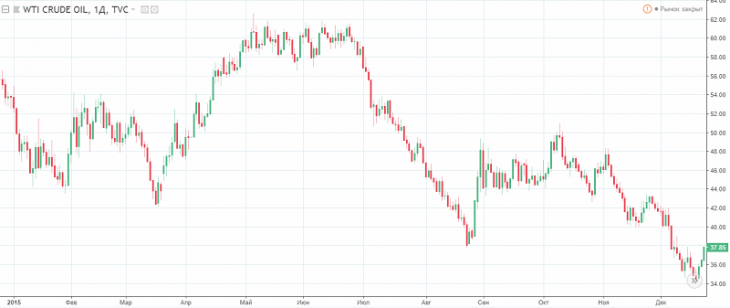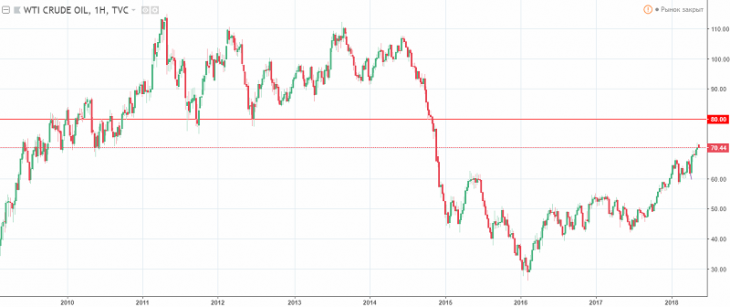
Ядерное соглашение с Ираном, ядерная угроза или рычаг влияния на рынок нефти
Ядерное соглашение с Ираном. Немного дат.
Начиная с 2005 года длились переговоры между Ираном и группой 5+1 (США, КНР, Россия, Великобритания, Франция и Германия). Целью данных переговоров было выяснить, что Иран не собирается создавать ядерное оружие, а развивать только мирный атом; и заключить ядерное соглашение.
15 июня 2015 года Иран и страны «шестёрки» достигли соглашения по иранской ядерной программе, в результате чего были отменены санкции против Ирана. Данное соглашение, помимо полного снятия санкций с Ирана и разрешения вести международный бизнес, вернуло в рынок одного из крупнейших производителей нефти, что стало одним из драйверов снижения нефти в 2015 году.

Рис.: График нефти WTI в 2015 году
К концу июня Иран начал возобновлять до санкционированные объёмы добычи, что и спровоцировало нисходящее ралли нефти.
8 мая 2018 года президент США Д. Трамп заявил о выходе США с соглашения по ядерной программе Ирана, тем самым фактически ввёл новые санкции против Ирана. Но эти санкции направлены в основном против иранских военных сил и не идут ни в какие сравнения с прежними санкциями США.
Реакция мирового сообщества на выход США из соглашения по Ирану
Основные партнёры США и члены «шестёрки», среди которых Великобритания, Франция и Германия, резко раскритиковали данное решение. Опираясь на то, что США может обострить ситуацию на Ближнем Востоке и в одностороннем порядке принимает решения по данному соглашению.
При этом Штаты в своём решении получили поддержку со стороны Израиля и Саудовской Аравии. Так, ранее Израиль заявил о неопровержимых доказательствах создании ядерного оружия Ираном. А Саудовская Аравии заявила о намерениях стать ядерной державой на опасениях ядерной угрозы со стороны Тегерана.
Сам Иран очень остро отреагировал на действия США и заявил, что Штаты пожалеют о своём решении.
Чего ждать дальше
В контексте мировых отношений и недавних торговых противостояний США против Китая и ЕС, действия США остаются направленными на реализацию своих интересов. И это происходит , на фоне роста добычи нефти в США, которая остаётся на исторических максимумах и поступается только добыче в России.
ЕС, естественно, не выгоден рост цен на нефть и энергоносители, не говоря о втягивании их Америкой в военное противостояние на Ближнем Востоке. В итоге это только подтвердит значимость влияния США на мировую экономику и экономику еврозоны.
В сложившейся ситуации нефть, вероятно, продолжит дорожать на обострении ситуации на Ближнем Востоке. Катализатором данного конфликта станет количество санкций США относительно Тегерана.
Это может стать отличным драйвером нефти для роста и обновления уровней в 80$ за баррель и это при весьма высоких объёмах мировой добычи нефти.

Антон Ганзенко